politics
Housing End Game - What Happens When No One Can Afford a Home - Biko Konstantinos video
 "The housing market is facing the worst housing affordability ever - yet house prices continue to show extreme strength. So what's the housing end game when the majority of people can't afford a home - what's the future for house prices. This video features sections from the video: "If Nobody Can Afford A Home...
"The housing market is facing the worst housing affordability ever - yet house prices continue to show extreme strength. So what's the housing end game when the majority of people can't afford a home - what's the future for house prices. This video features sections from the video: "If Nobody Can Afford A Home...
Marine Le Pen likely to be next French President
 Alexander Mercouris of the Duran makes a good summary of what is happening in French politics at the moment in this short embedded video. Inside I make some comments.
Alexander Mercouris of the Duran makes a good summary of what is happening in French politics at the moment in this short embedded video. Inside I make some comments.
Half of Western Sydney foodbowl land may have been lost to development in just 10 years - Article by Nicky Morrison and Awais Piracha
More and more farming land is being lost to other land uses such as housing on the outskirts of our cities. But how much land is being lost? And why does it matter?
Pro-population increase advocates blind to sustainability crisis - By Stephen Williams
 Any new inquiry into Australia’s migration program needs to assess the full costs and benefits of population growth, especially the costs to our environment and the risks of collapse. I wish I had a dollar for every pro-population-increase article I have read that begins by telling the reader that Australia is a nation of immigrants, with some 25% born overseas and about 50% with at least one parent born overseas.
Any new inquiry into Australia’s migration program needs to assess the full costs and benefits of population growth, especially the costs to our environment and the risks of collapse. I wish I had a dollar for every pro-population-increase article I have read that begins by telling the reader that Australia is a nation of immigrants, with some 25% born overseas and about 50% with at least one parent born overseas.
Fix Our Politics
For the 80% of us in the sensible centre of Australian life
Website: www.sensiblecentre.org.au
We think both Right and Left have failed to empower ordinary citizens and instead created a political and managerial class that puts its own interests before the community and national interest. We also think that about 80% of Australians are of the same mind.
We have a Ten-Point Platform for the coming federal election:
· Restore civility to politics and end the culture wars
· Remove career politicians from Canberra and return to citizen self-government
· Wind back the managerial class so we can reform our institutions
· Break-up the Big Four banks, Big Three utilities, Big Two retailers and One Big Telco
· Limit CEO salaries in companies subject to federal licencing (banks, finance, AusPost) with a cap at 40 times the company's lowest wage
· Return the budget to surplus and eliminate debt by ending corporate and middle-class welfare
· Personalise social services and individualise their funding so they serve consumers and families
· Place a moratorium on immigration until social cohesion is restored and infrastructure and services catch up with our population
· Build a competitive energy market that is source-neutral so consumers and businesses can set their own energy transitions
· Chart an independent course for Australia in security and world affairs without deference to either China or America
We will seek registration as a political party to participate in all forms of our democracy, at federal, state and local levels.
We also want members to come together by industry and interest in Working Commissions in areas such as NDIS, Centrelink, banking, energy and superannuation. We aim to develop political strategies and market-based initiatives in these areas to wind-back the power and patronage of the political and managerial class and empower citizens.
Further details are available at our website www.sensiblecentre.org.au
There are many ways in which to become involved. We look forward to your participation.
Vern Hughes
0425 722 890
Director
Civil Society Australia
[email protected]
www.sensiblecentre.org.au
In Praise of climate deniers (not)
 Well not really praise as such but, bear with me, while I justify wandering into this absurdity. I know it's difficult to say nice things about MP Craig Kelly, who claimed that people would die because renewables were raising electricity prices. He was perhaps unaware that the World Health Organisation in 2008 calculated that coal particulate pollution caused one million deaths across the world. And Tony Abbott who, between mouthfuls of onion, told us that coal was good for humanity - which was in opposition to both the Pope and the British Royal family's position - the two institutes he holds dear to his heart. Those are just two of 34 confirmed deniers in the LNP, although the Institute of Public Affairs claims half of the LNP members are supporters of their position.
Well not really praise as such but, bear with me, while I justify wandering into this absurdity. I know it's difficult to say nice things about MP Craig Kelly, who claimed that people would die because renewables were raising electricity prices. He was perhaps unaware that the World Health Organisation in 2008 calculated that coal particulate pollution caused one million deaths across the world. And Tony Abbott who, between mouthfuls of onion, told us that coal was good for humanity - which was in opposition to both the Pope and the British Royal family's position - the two institutes he holds dear to his heart. Those are just two of 34 confirmed deniers in the LNP, although the Institute of Public Affairs claims half of the LNP members are supporters of their position.
Money and truth
That sounds like a lot of politicians on the wrong track (the US has 180 deniers in Congress!) and its certainly one of the reasons that action on climate change has stalled. But there are a total of 226 federal politicians in both houses, so what were the rest doing? Can 34 deniers be so powerful as to dominate an issue, or are these the nice guys who are actually honest enough to nail their colours to the mast and challenge their electorate to vote for them on the policies and their natural charm and charisma? And, as such, are they not more commendable than the other 192 so called “believers”, including Malcolm Turnbull, who promote or knowingly participate in the processes that are destroying the planets climate?
Which then prompts the question as to why on earth would we have a higher percentage of deniers in parliament than in the general public, and why are so many advocating or just accepting policies that harm the planet? Well, there is money, and lots of it, that comes from those who would like the government to continue with policies that benefit the donor at the expense of the environment. These donations are so important, and so potentially embarrassing, that the major parties have only been transparent with 10 to 20% of their disclosures. What we do know is that Fossil Fuel companies have declared donations of $968,343 to the ALP, Liberal and National parties in 2016-17, which was slightly down from the $1.03m donated in 2015-16 and $1.94m in 2014-15 (which was also a Federal election year).
https://theconversation.com/the-truth-about-political-donations-there-is-so-much-we-dont-know-91003
The usefulness of economics in political ideology
However even the most cynical politician, one who depends on this source of money for re election, would baulk at supporting some of the improprieties we have had thrust upon us by successive governments, unless there was some way to quell his/her distaste for their parties' actions. One way this can occur is via embracing a particular ideology - which by definition is a system of beliefs and ideals which forms the basis of economic or political theory and policy. As such, it's not all that different to its equivalent in religion – faith – as both tend to smother reasoning lest it lead to inconvenient conclusions.
Ideology plays a big part in how political parties and governments function, largely because aspiring politicians can't get endorsement without supporting the parties' theories and must then ‘tow the party line’ or risk dis-endorsement. But it does mean that a minority group can usurp control of a party, something that has occurred in all parties: The modern Liberal is nothing like the Menzies model which was high tax, (by today's standard) protectionist on trade, big on regulation, and ran with a budget surplus and low unemployment (2.2%). The Labor party was instinctively socialist until Paul Keating embraced Milton Frieberg's fantasies with the result that we have two mainstream parties of the right with the Liberal party pushed into the hard right effectively destroying the moderates (wets) and handing power to the ultra conservatives. Barry Jones the former ALP science minister described this as "political compaction," giving voters a choice between McDonald's and KFC.
And when it comes to ideology economics is a star performer. No matter what political camp, be it neo conservative, (hard right) neo liberal, (center right to center left), socialism or communism, economics rules, and does so without a soul, because its criteria for assessment is reduced down to a single figure called the Gross Domestic Product (GDP). Governments of the world assume that this one statistic can show whether things are getting better or worse despite the occasional hic-up like the Global Financial Crises. Yet as a measurement it was only adopted in the war years when production (of war material) was the key to winning the war. It did not measure human health, education, poverty, unemployment or environmental damage because the war took precedence over all the things that make up human well being. As a result today's governments will still prioritize policies or projects that will add to GDP, especially if it does so in the governments term of office. They can also virtually ignore those things that are not measured in financial terms and this includes damage to human health or the environment which are dismissed as being “externalities” of lesser importance than its contribution to “the economy” .
Nobel family rejected economics for inclusion in Nobel Prize
Economists (and to a lesser extent politicians) are so obsessed with this they have described GDP as one of the greatest inventions of the 20th century - and they have a point. Because now there is something definitive to give them credibility as policy makers and guardians of wisdom even though there is no correlation between GDP and wellbeing. To enhance this self appointed credibility and to justify all the absurdities they inflict upon us, economists usurped the prestige associated with the Nobel prize which as you may know was an initiative of Alfred Nobel back in 1901. The awards were issued for Chemistry, Physics, Literature, Medicine and Peace, there was no prize for economics mentioned in Alfred Nobel’s will. This didn’t materialise until 1968, when the Swedish Central Bank wanted to do something special for its 300th birthday. It made a donation to the Nobel Foundation to sponsor a prize and to make it more acceptable they called it a prize for ‘economic sciences’. Since the economics prize is announced at the same ceremony it is virtually indistinguishable from the others but the Nobel family estate didn’t approve so at the family’s insistence, the prize was given the name it has – the Sveriges Riksbank Prize given ‘in memory of’ Alfred Nobel, and not a true Nobel prize. Which is just as well since Nobel specified that his prizes should go to people who’s work has “conferred the greatest benefit on mankind”. That’s relatively easy to decide a winner in the traditional sciences, but the economic prize has often gone to people with completely opposing views. One recipient, Myron Scholes the 1997 winner, will forever be remembered by the failure of his hedge fund Long-Term Capital Management (LTCM) which collapsed in 1998 losing $US4.6 billion of investment.
Like any Nobel, the prize gives economists a stamp of approval in the mind of the general public, legitimising their entire philosophy. Of the 74 laureates so far, 28 are affiliated with the University of Chicago, the home of neoliberalism including Milton Friedman and Friedrick Hayek (architects of what become known as Reaganomics - deregulation, and the trickle down effect which double the US national debt) but even Hayek expressed doubt about the award saying:
“If I had been consulted whether to establish a Nobel Prize in economics, I should have decidedly advised against it. The Nobel Prize confers on an individual an authority which in economics no man ought to possess.”
Economic absurdities and political policies
This does not matter in science where the influence exercised by an individual is chiefly on his fellow experts - and they will soon cut him down to size if he exceeds his competence. But economist have influence over laymen: politicians, journalists, civil servants and the public, which gives them undeserved authority that is often used to override warnings from almost all other avenues, including scientific bodies. John Howard once remarked that “we could grow forever,” later admitting that we would need to rely on imported food to do so. Larry Summers, a former adviser to President Obama, stated, "The idea that we should put limits on growth because of some natural limit is a profound error, and one that, were it ever to prove influential, would have staggering social costs." It is a comment often repeated, despite being contrary to even basic mathematics, and was justified by referring to growth as being “sustainable”. When this was seen to be an oxymoron the wordsmiths produced an alternative, environmental problems can be “decoupled” - that is isolated - from growth, and even from population growth. There is no doubt that this form of economics, with its obsession with an ever expanding economy and dubious accounting, has been a great benefit for corporations like the fossil fuel industry. But it is also partially or wholly responsible for most of problems that now beset the world, including plastic pollution in oceans, air pollution in cities, the obesity pandemic, the collapse of coral reefs, and all the threats associated with catastrophic climate change. All so much different from a previous age, when President Kennedy was said to have had a plaque on his desk with the message, “The Buck Stops Here,” meaning that responsibility lies with those in power. Oddly enough the last time Australia had a prime minister who took responsibility for his mistakes was when Kevin Rudd admitted we could not meet his GHG reduction targets because of the population growth he had championed. And his Big Australia dream is still alive and well in the major political parties as well as the Greens.
Don Owers
The Left Has Been Highjacked
 The left has been hijacked by unwitting servants of the neo-liberal agenda.
The left has been hijacked by unwitting servants of the neo-liberal agenda.
I was talking to a friend the other day explaining how I always considered myself left wing, but now apparently I wasn’t. I explained why and she declared that the left has been hijacked.
And it struck me: she is right, it totally has. Remember when the left was about worker’s rights? It was about preventing the rich giving themselves privileges whilst denying ordinary people both rights and access to resources. It was, in large part, about protecting people and the environment from the rapacious appetites of the elite rich. In short, the left was about ensuring that everyone had a level of human dignity and the ability to raise a healthy, happy and educated family.

So what is the left now? – I tell you it is no longer about these things. I know this because I am being told that am I no longer left wing, but alt right wing. I tell you why I find this strange, for many years I have written, spoken publicly and protested against: TPP trade agreements; GMO’s; Fracking; homelessness; and the destruction of the environment. I am, and have been involved in environmental groups for over a decade. I have been a union branch committee member for nearly 10 years, I have gone on strike while colleagues kept working. I have gone on union marches. But I am informed, by other supposedly left wing people, that I am now right wing. Even though I continue to do all these things. It gets worse, not only am I being told I am right wing, but I have also recently been categorised with Incels. Why? To be honest, I don’t fully understand the logic, but it seems it has lot to do with not agreeing that there is a “Patriarchy”, and accepting the whole gamit of complaints and grievances based around this concept.
It seems now that you are not left wing if you fight for worker’s rights, you must largely forget that and fight now for trans-rights, for same-sex marriage rights, you must denounce the Patriarchy and acknowledge it as the source of all humanity's problems. This is NOT what the left wing used to be about.
Thus the left wing has been highjacked. And I argue that it has been highjacked by – perhaps unwitting – servants of everything the left wing used to stand against. The left has been highjacked by agents of the neo-liberal system.
We do not see in our papers headlines decrying the excesses of the rich, we do see headlines about global warming – but only because it can no longer be ignored. But where is people’s energy going? It is going into false battles about same-sex marriage, about supposed Patriarchy – which sets women against men - causing much damage and pain. Meanwhile – hidden behind this smoke screen - the rich get richer, the earth dies, common people bicker and argue about Patriarchy and marriage rights while everything burns around us. And all the while the press declares this as progress, and trumpets changes in laws about marriage, and discriminating for women (and against men) as signs of progress. The world is being destroyed, families are being destroyed, debt is growing, congestion is growing, the environment is being destroyed, and men are being pushed out of work, becoming more and more sidelined in society. Families are falling apart and people becoming more frustrated, more angry and more violent. Yet amongst all this discord it is declared that there are signs of social progress. What a bloody mess! And who can we turn to now? The union movement has almost been crushed by neo-liberal forces, or sold out to growth, and it too has been directing resources into the new ‘left’ agenda.
Where do we turn? It seems the neo-liberals have finally won at last. I guess we will all go down fighting and bickering about the various ways men have oppressed women though-out history, and still do today, as the rich appropriate the remaining resources on the planet then party as they watch it, and all us, die.
Things are Desperate - a Last Chance at Change Through Politics
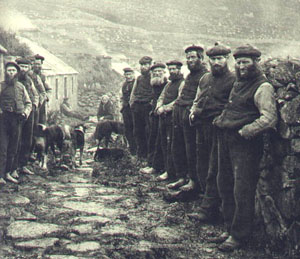
Hi Everyone,
This is a call to arms. The science and other evidence is now without doubt - we are in the final days of our civilisation, whatever it might be called by history; it is hardly Western Civilisation anymore, since the destruction of nature (and I would argue human values, and quite possibly humans) has extended now across the globe.
We have environmentalists who, mostly in small groups, have been fighting the enslaught against nature since industrialism began. They have had their successes, but the rate of destruction is too fast and vicious, and their efforts are overwhelmed.
There is one example that has recently prompted me to post this call. At Stanley one company (with more soon to join) are buying farmland and mining the water i.e extracting the water which is supposed to be for farming and selling it as though it is their own private property. This is not like mining gold, extracting water in this way extracts it from all the neighbours as well. And now more companies/selfish individuals look likely to join the extraction, adding to the problem.
The local community resisted this and took the fight to VCAT, then to the supreme court, then to the appeal court. They lost, and $90,000 worth of costs have been awarded against the community (see here see also: The Guardian on this).
What has failed here? Firstly local democracy: the local council and local community banned the extraction. VCAT allowed it. The second failure: the legal system: even if the outcome was fair, the cost of justice is too high - how can individuals and communities possibly fight such expensive battles, even in this case much pro-bono work was provided to get to the court. The final failure is political again: at state and national level. It is reported to me that neither of the main political parties are even prepared to meet with the residents of the community to discuss changing the law around water mining.
This is our system - change is stifled politically, and by an over-expensive justice system. So what is to be done? Previously on this site I have suggested starting alternative local 'shadow' parliaments, but calls for this have not been taken up. The permaculture community have a philosophy that people should not waste energy on the current system, but rather put their energy into the building the replacement. This is a view I have much sympathy with, but I fear the current system will not leave much to work with.
So what to do? I think at this stage it might be worth one last-ditch effort at political reform before the collapse becomes unrecoverable (collapse both environmentally and financially). Can we call for a new Party, one which is a union of all the little environmental groups, the civic groups and all the individuals that want to save nature and mankind? The trade union movement has failed us. It is pro-growth, seeking short-term outcomes (jobs) for its members cutting down the forests and building more monstrous buildings. So we need a new union - and we need it urgently to bring about radical reform. Even if the new Union of Australians (for want of a better name) does not achieve power, it may gain enough seats (or threaten loss of seats) to change policy.
So here is the call - who is with me? No-one can do this on their own. As we have learned from history, the only way everyday people can stand against power is to do it together, otherwise they are crushed - as we truly are being crushed now by the never-ending greed and power lust that has been unleashed over the past 200 - 500 years and is serving the interests of a small minority - as it ever has.
Ps: The photo above is supposed to be the St Kildan's leaving their Island - perhaps the last traditional community to be removed from the land in the process of the Scottish highland and lowland clearances. Something I will write more about shortly.
Practical Ways in Which Everyone Can Improve Society

Not many people are Christians these days. However, there is one aspect of Christian thought which is perhaps worth modern atheists considering. That is the idea that improvement needs to come from the ground up – i.e. from the grass roots. We may lament the poor quality of our politicians, the corruption of political donations, the failure of neo-liberalism, and we may feel we are somewhat powerless against these. Christian thought says otherwise. Christian thought sees society as a product of its members, as a sum produced from the parts. Under this ideology, if you improve the parts you improve the overall organism. Thus according to this idea - which in modern language is perhaps associated with the term synergy - individuals are not powerless. In fact, the quality of the whole depends on the quality of the parts.
So how then do we improve the parts – in this case the individual people? Well firstly we must identify the problems. Here are some that I can see (in no particular order):
- Increasing aggression (road rage, etc.);
- Increasing impatience with others – we see them as holding us up, not doing what we want, not agreeing with what we say;
- Increasing selfishness of various types, not considering others in a myriad of ways;
- Increased ‘transactionalism’ – seeing others as just a means to an end, not as people (eg. Shop attendants);
- Lack of humility – if others draw attention to any faults – whether rightly or wrongly – the response is anger and/or indignation.
Now these things could all be linked to the classic Christian vices, but even non-Christians would probably agree that most of the above are undesirable. And if we are honest, most of us will admit to exhibiting one or more of these failings regularly. Under the Christian concept, that is fine, and the secular mind is also unlikely to expect that everyone should be perfect. The traditional way of dealing with this is to practice mercy and forgiveness.
So what I propose is that everyone, Christian or not, spends some time each day reflecting on their own actions, whether they were selfish or not, whether they could perhaps have let that car change lanes in the heavy traffic, whether they were viewing the sales assistant at the shop as a fellow human, or just a kind of vending-machine to dispense what they, the customer, wants.
Perhaps if we all reflect on these points, and then try to improve ourselves in these regards then maybe, perhaps gradually or perhaps quickly, society will start to improve. And as a result people may find themselves much happier if they are consciously trying not to rush everywhere. Maybe rushing to get home to relax is not as good as enjoying life as one goes about one’s business? Maybe some decide to try and do less; maybe many are less angry and frustrated with others if they are trying harder to see things from the other’s perspective and value more the time they spend with them. And maybe, just maybe, people will reach the point where each of us can suggest faults and improvements without being confronted with anger and indignation, but rather humility, a humility which is prepared to accept, in the first instance, that the critic is right and then only after reflection make a judgement on the validity of any suggestions that have been offered.
There are many things that are out of our control. This situation is not unique. Soldiers like Simpson may not have been able to stop the first world war, but they could still do plenty to help their fellow men on the field of battle through selfless action. These actions no doubt made a huge difference in the lives of those they helped, as well their friends and family
The problem is power, and our failure to learn
No politicians with ideas, please!
 Kevin Rudd and Malcolm Turnbull like many other politicians seem to think of themselves as ideas men. Do we really need politicians with 'ideas' or are they a liability?
Kevin Rudd and Malcolm Turnbull like many other politicians seem to think of themselves as ideas men. Do we really need politicians with 'ideas' or are they a liability?

On Monday night’s Q and A on ABC1 TV, guests Kevin Rudd and Malcolm Turnbull, from the comfort of their respective non party leadership positions (and in Kevin Rudd’s case basking in the imagined glory of the way he would now be leading the country had it not been for the 2010 leadership coup) quipped and bantered between themselves throughout the show.
Especially not big population ideas
Their harmonious good humour finally evoked the question from an audience member as to whether they had considered jointly forming a new political party, to which they both agreed that they had not. Kevin Rudd even surpassed himself in wit saying that they would not be able to agree on the leadership (of such a party)! During the program I heard one of them say that he had “a few good ideas” as did the other (giving the other due credit ) In other words they are a pair of mutually self proclaimed “ideas people”. I hate to think what those ideas are and am 100% certain that they would involve a huge population for Australia. Both men are on record as advocating this.
I suppose whichever of Tweedle Dum and Tweedle Dee said that they of had "ideas” thought that the idea of their ideas would be enticing to the audience.
But do we really need politicians to have ideas?
It always seems to be the materialization of someone’s big idea that clashes with the needs and wants of others and with nature. Politicians should be in the business of appreciating what we have and trying to withstand assaults on it rather than contributing their own ideas to its transformation along with the myriad developer and big business ideas that we are assailed with.
Megalomaniac dreaming
Two megalomaniacs dreaming up an Australia which is nothing like the Australia we live in is not what Australia needs. The best tools for a politician are a set of guiding principles and a philosophy.
Politicians with ideas just make more work for the rest of us. We have to correct them, modify them, try to premept them and pay for their projects whether we like them or not. We have to interrupt our own lives to try to avert the disasters their ideas can become.
Overactive children
It is a bit like cleaning up after a very imaginative and active child has been in the house all morning playing in the kitchen cupboards. The unfortunate difference with politicians who have ideas and want to make their mark is that the results are more costly. We have far more difficulty controlling them and we can’t lock them in their rooms when they make a mess.
Ideas are great for those in creative fields. If an artist has an idea and chooses to put it on paper or canvas, that’s fine whether I like the idea or not. Unless I am forced to hang the picture in my house it doesn’t affect me. A friend’s ideas expressed in very bad poetry are OK unless he asks to read them aloud to me. It’s when you get into the materialization of large scale ideas such as buildings, roads, bridges and other engineering works as well as large populations that the sensitivities of the rest of us collide with the ideas person.
I’ve convinced myself. We do not need politicians with ideas. We actually need them not to have ideas, and for them to take expert independent advice for their decisions. Apart from this I would appreciate it if they could keep things running smoothly in the background so that I can get on with my life.
How Jackson, Lawler and Abbott tangled Thomson with the HSU - by Peter Wicks
 There are many suspicious features about Craig Thomson’s Health Services Union imbroglio, but notable among them are the apparently close links between HSU “whistleblower” Kathy Jackson and Federal Opposition Leader Tony Abbott. Peter Wicks uncovers a very tangled web.
There are many suspicious features about Craig Thomson’s Health Services Union imbroglio, but notable among them are the apparently close links between HSU “whistleblower” Kathy Jackson and Federal Opposition Leader Tony Abbott. Peter Wicks uncovers a very tangled web.
Article written by Peter Wicks, originally published by Independent Australia on 16 May, 2012 1:36 am.
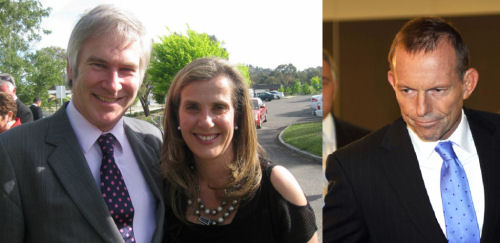
The major saga embroiling the Federal Government at the moment, besides the curious Peter Slipper and James Ashby affair, is the Health Services Union (HSU) debacle.
Firstly, let me start by saying that I do not endorse anyone spending over $6,000 on prostitutes on a union credit card — that is reprehensible behaviour. Nor do I endorse not declaring vast amounts of money to the Electoral Commission on election campaigns. However, these allegations are yet to be proved — and are vigorously denied.
In any case, I think I smell a rat.
Union whistleblower Kathy Jackson has been ripping into both the Labor Party and the former (until February 2012) President of Fair Work Australia, Geoffrey Giudice, for months now over the goings on within the embattled Union and the investigation resulting from her claims.
Kathy Jackson has caused the union movement untold damage and brought the Federal Government to the brink of collapse. One would assume that the public may be interested in knowing a little more about her and any conflicts of interest she may have.
One vital piece of information that is not widely known about her is that her partner is a man named Michael Lawler.
Who is Michael Lawler?
For starters, according to reliable sources, Michael Lawler is friends with a man named Tony Abbott. Apparently, the two of them socialise regularly. Conveniently, Tony Abbott is also the leader of the political party making so much ground out of the claims Michael’s partner is making.
Michael Lawler works for an organisation called Fair Work Australia, where he is a Vice-President on a salary of $400,000 a year. The only person higher than him at that organisation is Iain Ross, who just replaced Geoffrey Giudice – the one who Tony Abbott and Lawler’s partner Kathy Jackson were attacking daily – as President of Fair Work Australia.
 On the 11th of October 2002, according to the FWA annual report, Michael Lawler was appointed Vice President of Fair Work Australia — although back then it was called the Australian Industrial Relations Commission. Previously, Lawler was a barrister who made his mark representing employers in employment disputes. The man who appointed him to the AIRC was none other than Tony Abbott — who at the time was Employment and Workplace Relations Minister under John Howard’s Coalition Government.
On the 11th of October 2002, according to the FWA annual report, Michael Lawler was appointed Vice President of Fair Work Australia — although back then it was called the Australian Industrial Relations Commission. Previously, Lawler was a barrister who made his mark representing employers in employment disputes. The man who appointed him to the AIRC was none other than Tony Abbott — who at the time was Employment and Workplace Relations Minister under John Howard’s Coalition Government.
On his appointment, Tony Abbott gave a speech praising Lawler in a remarkably personal and intimate fashion. Here is some of what he said that day:
“Intellect combined with common sense, compassion tempered by realism, ideals shaped but not dimmed by experience, some grasp of the nobility and waywardness that contend in every man: these, in my view, are some of the qualities which Vice President Lawler will bring to the demanding and often lonely life that lies before him.”
At a function to farewell Tony Abbott from his position as Employment and Workplace Relations minister the following year, Lawler was one of just four members of the AIRC to attend.
Independent Australia requested confirmation from Tony Abbott’s office about the relationship between the Opposition Leader and Michael Lawler, but had not received a response by the time of publication.
The Opposition always refer to Fair Work Australia as Julia Gillard’s “baby”, but Lawler was certainly Tony Abbott’s appointment.
Of course, all these things may be purely coincidental…
However, it does appear strange that Mr Lawler seems to have become involved in factional battles within the union on his partner Kathy’s behalf.
Carol Glen was the Victorian Divisional Secretary of HSU East for three years before resigning recently. At the time, Kathy Jackson was National Secretary of HSU East, and Michael Williamson was the General Secretary of HSU East.
Carol resigned due to the factional fighting within the union, particularly between Jackson and Williamson.
However, Jackson clearly did not want Carol to resign, as she feared that Williamson would replace her with a Divisional Secretary loyal to him.

- Former HSU official, Carol Glen
This is the point where Lawler became involved in the factional battle within the Union, even though he was not a part of the HSU himself.
Carol Glen, in a written complaint to former Fair Work Australia President Geoffrey Giudice, alleges she received an “aggressive” phone call from Lawler, who told her:
“You can fuck off and take sick leave if you don’t want to do the work and still be paid, but you can’t resign.”
Michael Lawler did not work at HSU East, and this complaint went directly to his only superior in Fair Work Australia, Geoffrey Guidice.
Then, just a few days later, Lawler made corruption allegations against Carol to NSW Police and Strikeforce Carnarvon was born.
It is odd that this type of complaint would come from Lawler — as he was not part of HSU East or even a member of the Union.
As part of his complaint of corruption, Lawler made reference to a cheque that was being picked up by Carol — something he said she had mentioned in an email. The inference was that this cheque was some sort of pay off.
The Australian details the claims made by Lawler and the subsequent reaction by Glen:
Mr Lawler claims Ms Glen may have been given an inducement to give false evidence, noting that in a private email exchange with her partner in December, she had referred to a cheque she was going to pick up.
“I had ordered a bank cheque to pay my rent,” Ms Glen said, questioning how Mr Lawler had obtained her emails. She says she finds it extraordinary that Mr Lawler, the second highest industrial judge in the land, would engage in such a campaign.
Mr Lawler’s associate said it would be inappropriate for him to comment.
So, in fact, the cheque was a bank cheque ordered by Carol to pay her rent — totally innocent and unrelated to any Union business at all.
However, the question remains: how would Lawler know about the cheque? Given he mentioned a “private email exchange”, it would seem certain that he somehow had access to Ms Glen’s emails. So, how did Lawler have access to Glen’s private emails?
We don’t know, because as soon as he was asked about this detail, Lawler’s associate clammed up.
All decidedly suspicious.

On the 2nd May, police officers from the NSW Fraud and Cybercrime Squad raided the HSU East headquarters in Pitt Street, Sydney, in a much publicised operation.
However, my inside sources have pointed out a few anomalies about the official story of the raid that was reported in the press. Police were offered the option of using the service elevator and the rear entrance to the building to make things simpler, safer, and faster for officers — but this offer was rejected as the police were reportedly keen to use the main entrance, where the press had been assembled. Sources also state that the large number of boxes shown on TV being carried out by officers were all virtually empty — it was allegedly all done for show, to make it look like there were mountains of documents seized. Also, sources say, the story about HSU boss Michael Williamson trying to sneak out a back door with evidence was total rubbish — done presumably to implicate guilt. In fact, Mr Williamson left the office via the entrance the police were offered access to, as his car was parked in the car park opposite; the things he was carrying were taken by police as a routine part of the operation, as were his personal items — and probably a sandwich as well.
Of course, Kathy Jackson has acted very strangely for a so-called union boss.
In Melbourne, Jackson has hired Stuart Wood, a former Vice President of the HR Nicholls Society, as her lawyer. The HR Nicholls Society is a right-wing lobby group with close ties to the Liberal Party, set up as a think tank dedicated to Industrial Relations “reform”— much of which fed into the architecture of the Howard Government’s infamous “WorkChoices” policy.
It would seem valid to question why the Secretary of a union would hire a solicitor that is anti-union — and, indeed, one whose ideas you have apparently spent your whole working life fighting against. A quick look at HR Nicholls Society’s website shows just how close its ties are with the Liberal Party. Former Howard Government industrial relations minister Peter Reith is a board member, for example, and other notable names on the list of who contributes to this Society are Tony Abbott (there’s that name again), Eric Abetz, Peter Costello, Michael Kroger… the list goes on and on — even Andrew Bolt gets a mention.
Even more strangely, for a union rep, Jackson is due to be guest of honour and give a speech at the HR Nicholls Society annual dinner on June 12th. Strangely, Mal Brough – who has been accused of being implicated in the allegations against Peter Slipper – fronted the HR Nicholls Society only a week or two ago [note below video].
And, in yet another strange coincidence, Peter Slipper accuser James Ashby is using Kathy Jackson’s Sydney lawyers.
On the 14th May, on the Chris Smith programme on radio station 2GB, Kathy Jackson said that rumours of the Liberal party paying for her vast team of lawyers were rubbish. These lawyers, expensive lawyers, were all working for her for free – pro bono – she stated. Chris Smith, however, chose not to pursue the matter…
People can say whatever they like about Craig Thomson’s credibility and his explanation of events, however most people would find it totally unbelievable, and absolutely inconceivable, that these right wing lawyers, one of them from a Liberal Party aligned union busting “think tank”, would provide their services free to a union boss — especially one who pays herself a $270,000 salary.
So, it would seem there are many questions to be asked — and not just of Craig Thomson.
The mind boggles as to how someone who is a former employers’ barrister in their disputes with unions and was appointed to the AIRC by Tony Abbott as well as allegedly being a personal friend, is able to allegedly hack the emails of a Union official and then make a criminal complaint regarding this Union even while being the Vice President of the organisation actually in charge of investigating the same Union — as well as being the partner of the Union whistleblower most deeply enmeshed in the whole affair, who is soon to speak at a function for a union busting Liberal Party-aligned think tank, and who is being represented in all her actions against the union for free by the Liberal Party’s favourite lawyers — and yet none of this is widely reported in the media, or seemingly of any major interest to police?
Talk about conflicts of interest.
What is really going on here?
In my mind, all this puts question marks over the entire investigation — and makes me wonder about the Coalition’s direct involvement. After all, George Brandis repeatedly kept pushing for more investigations. If nothing else, Jackson, Lawler, Abbott – and the NSW police – have some serious questions to answer.
I don’t know how deep this runs but, like I said, I smell a rat.
(This is an abridged version of a longer story WIXXYLEAKS.)

This work is licensed under a Creative Commons Attribution-NonCommercial-NoDerivs 3.0 Australia License
There Are Limits To Conservation
 Neither The BC Liberals Nor the NDP Will Question The Population Growth Which Drives Energy Consumption
Neither The BC Liberals Nor the NDP Will Question The Population Growth Which Drives Energy Consumption
Dan Doyle, the Chair of BC Hydro, appeared on BC Global TV News on July 14, 2010 to say that the corporation must spend as much as $220 million this year importing power from the United States to meet the province’s energy needs---some 10%. The province in fact has had to import power for the last 9 years, at a cost of $25-30 million per year. But thanks to the Peace River drought and a drop in the water volumes in hydro-electric reservoirs, recently at 77% of normal inflows—the fourth worst in 50 years-- BC Hydro will have to spend eight times that amount on imported energy this year---much of it from “dirty” fossil fuel sources. NDP energy critic John Horgan warned of a coming rate shock of 29% to meet the extra costs, but BC Hydro is looking to gain permission to defer these costs to the future by tapping into a “rainy day fund” that would be replenished when the rain returns to ‘normal’ patterns. The concept that global warming might thwart that confident expectation apparently does not enter Mr. Doyle’s mind. In less than a year the deferral fund will be in the red by $730 million---enough that would require a 21% rate hike to liquidate.
What Mr. Doyle, Mr. Horgan and Liberal Premier Gordon Campbell have in common is their acceptance of population growth as a given. Campbell says that BC will grow by a million people in the next 20 years. Former NDP environment critic, Shane Simpson, once proclaimed in Campbell River to an NDP gathering in January of 2007 that he “will not tell people not to come to British Columbia.” And neither will he tell people not to come to Canada. According to the 2006 census, some 80% of new BC residents came from other countries, and that percentage grows by the year. BC in fact attracts more immigrants per capita than any other province. But neither will Mr. Simpson, nor Mr. Horgan or anyone else in the BC NDP caucus tell the federal NDP to not to lobby for higher immigration quotas. Like local and provincial politicians of all parties, they dodge immigration issues by hiding behind the skirt of provincial jurisdiction, arguing that they cannot do anything about incoming migration from any source. Yet they eagerly collude with their federal counterparts by offering support for their political campaigns as a quid pro quo for leveraging more federal dollars to cope with the demands that issue from hyper immigration. More money for ESL training, for infrastructure projects and a myriad of other expenditures.
Absurdly, Horgan joins the BC Hydro chorus and calls for more energy conservation. The answer, it seems, is to develop alternative energy sources and “conserve”. It is doubtful that the NDP, the Greens or the Campbell Liberals ever met a problem that could not be solved by decreasing per capita consumption and waste and increasing “efficiency”----the great elixir for all that ails us. Campbell’s “Clean Energy Act” even held out the promise of reducing ,through conservation, the forecasted growth of electricity demand in B.C. by 66% and a reduction of green house gas emissions by 33% in the next ten years ---all the while an average of 50,000 new residents are hopping on board the provincial energy train each year. Nevertheless, while conservation would slow the rate of increasing energy consumption by as much as two-thirds, it would not stop it. In fact, according to Campbell, provincial energy demands will grow by 20-40% by 2030. Fast or slow, growth is growth, and it is definitely not sustainable.
BC Hydro, of course, comes equipped with all the trendy buzzwords necessary to make this pitch palatable to any who might doubt its mission of having us believe that we can have our cake and eat it too. Everything will be “smart”, “green”, “sustainable” and “efficient” on the road to population overload. Move over, California! “The Power Smart Sustainable Communities Program” will help developers “green their projects by providing expertise, education, program support and financial incentives.” “District energy systems” will “provide a reduction in overall energy use and are able to utilize the most environmentally friendly available source of energy such as biomass, waste heat or geoexchange heat pumps.” Don’t worry about the fact that some 200,000 more housing units will have to be constructed to accommodate the half a million new energy consumers who will make B.C. their home in the coming decade. These housing units will all be “smart, green, sustainable and efficient.” In the virtual reality of the trendy green imagination, we can apparently decouple economic and population growth from all negative ecological impacts. We can conserve, reuse, recycle and retrofit growth of existence. As we grow our cities up and out and burst urban boundaries with more and more housing, we can install CFL lights, “energy star” appliances, induction stove cooking tops, solar panels, apply paint that protects air quality, and offer new types of roofing materials, insulation, carpets and pavement. All the things that will allow a theoretically infinite number of people to share this wonderful land. No doubt one can expect that soon thirst will be decoupled from water and ice cream consumption will be decoupled from weight gain.
The network of dams built between 1960 and 1980 are aging assets that require massive maintenance inputs of over $10 billion in the next five years. In addition, the Site C dam project will possibly require $15 billion dollars, and promises to supply power to some 410,000 homes in the province---a gain that would be wiped out in twenty years by the province’s expected growth. The NDP argues that a Site C dam is unnecessary, just as it argued a half century ago that W.A.C. Bennett’s hydro megaprojects were unnecessary. They wince at the prospect of seeing 5,340 hectares of flooded land, and worry about its effect on agriculture and the environment---while remaining oblivious to the impact of immigrant-driven growth on those very same things. But rather than strike at the root of rising energy demands---the exponential growth in the number of consumers in British Columbia---they argue for all the boy scout measures that would reduce per capita consumption. One day they will learn that there are limits to conservation.
Tim Murray
July 15, 2010
You-tube film: The Story of Your Enslavement
This is a good film about how government and capitalism deprives people of freedom and gets them to coerce each other. It attributes increases in wealth since the second world war to increases in financial freedom, apparently not understanding the importance of the vast store of fossil fuels we have exploited since the 18th century. Nonetheless it makes good and valid points on a classic them.
Comments and discussion welcome.
For instance, is it really sufficient to 'see' your prison in order to escape it?
US Corporations threaten peoples' internet - read and act

Republished from http://www.colorofchange.org/opennet/
Dear friends,
The Internet has made amazing things possible, like freeing the Jena 6 and electing President Obama. None of it could have happened without an "open" Internet: one where Internet service providers are not allowed to interfere with what is seen and by whom.
Comcast, AT&T, Verizon - powerful broadband providers
Now, Comcast, AT&T, and Verizon -- the most powerful broadband providers -- are trying to fundamentally change the way the Internet works. They're seeking to make even bigger profits by acting as gatekeepers over what we see and do online. If they succeed, the Internet would be more like radio and television: a few major corporations would control which voices are heard most easily, and it would be much harder for grassroots groups, individuals, and small businesses to compete with large corporations and well-funded special interests.
Big Money affecting democracy
The Federal Communications Commission (FCC) wants to do the right thing and keep the Internet open, but the big providers have been attacking their efforts, with help from Black leaders who have financial ties to the industry. And a recent court ruling just made the FCC's job even tougher.[1] If the FCC is to preserve an open Internet, they will have to boldly assert their authority and press even harder. It's why they need to hear directly from everyday people about the importance of an open Internet, now.
Send them a message
Will you join me in sending a message to the Federal Communications Commission supporting their effort to preserve an open Internet? It takes only a moment:
http://www.colorofchange.org/opennet/?id=2432-1205225
Net neutrality
The FCC is working to create rules that would protect "net neutrality," the principle that protects an open and free Internet and which has guided the Internet's operation since it began. It guarantees that information you put online is treated the same as anyone else's information in terms of its basic ability to travel across the Internet. Your own personal website or blog can compete on equal footing with the biggest companies. It's the reason the Internet is so diverse -- and so powerful. Anyone with a good idea can find their audience online, whether or not there's money to promote the idea or money to be made from it.
Big providers working on controlling internet information stream
AT&T, Comcast, and Verizon are spending millions of dollars lobbying to create a new system where they can charge large fees to speed up some data while leaving those who can't afford to pay in the slow lane.[2] Such a system could end the Internet as we know it -- giving wealthier voices on the Internet a much bigger megaphone than poorer voices, and stunting the Internet's amazing equalizing potential.
Front groups posing as your friend
Buying the support of Black organizations?
President Obama strongly supports net neutrality, and so do most members of the FCC. With so much at stake for Black communities, you would expect Black leaders and civic organizations to line up in support of an open Internet.
But instead, a group of Black civic organizations is challenging the adoption of net neutrality rules. Some of the groups are nothing more than front groups for the phone and cable companies. Others, however, are major civil rights groups -- and all of them have significant financial ties to the nation's biggest Internet service providers. For example, AT&T donated half a million dollars last year to the NAACP, and led a drive to raise $5 million more[3], and boasts of donating nearly $3 million over the last ten years to a number of Black-led organizations.[4] Verizon, meanwhile, recently gave The National Urban League and the National Council of La Raza a $2.2 million grant.[5] Comcast is one of the National Urban League's "national partners" (Comcast Executive Vice President David Cohen now sits on the NUL's Board of Trustees)[6], and the NUL's 2008 annual report notes that Comcast donated over $1 million that year.[7] Many of these groups have now filed letters with the FCC opposing or cautioning against net neutrality,[8,9,10,11] and the Internet service providers are using the groups' support to promote their agenda in Washington.[12,13]
Wannabe gate-keepers false 'trickle-down' argument
The main argument put forth by these groups is that net neutrality rules would widen the digital divide. They say that unless we allow Internet service providers to make bigger profits by acting as gatekeepers online, they won't expand Internet access in under-served communities. It's a bogus, trickle-down argument that has been thoroughly debunked.[14, 15] Expanding access to high speed Internet is an extremely important goal. But Internet service providers are already making huge profits,[16, 17] and if they believed that investing in low-income communities made good business sense, they would already be doing it. Allowing them to make more money by acting as toll-takers on the Internet won't change that. When these civil rights groups have been asked to back up their arguments, none have been able to do so without appealing to discredited, industry-funded studies.[18] Nevertheless, the FCC has taken notice of what these civil rights groups are saying about net neutrality, and is wary of going against them for fear of being perceived as insensitive to minority concerns.[19]
Now it's up to you
Now it's up to you
The FCC wants to do the right thing and implement net neutrality rules. FCC commissioners know, as we do, that the anti-net neutrality arguments coming from civil rights groups are bogus. But they don't want to appear to be on the wrong side of Black interests.[20]
We need to demonstrate that there's support among Black folks and everyone else for protecting an open Internet. Please join me in telling the FCC that we support net neutrality.
You can add your voice here
You can add your voice here:
http://www.colorofchange.org/opennet/?id=2432-1205225
Thanks.
References:
1. http://bit.ly/drWbQ3
2. http://www.savetheinternet.com/threats-open-internet
3. http://bit.ly/akyXZS
4. http://bit.ly/aGOz89
5. http://www.nclr.org/content/news/detail/54262/
6. http://bit.ly/93zDr6
7. http://bit.ly/dnqyq4
8. http://fjallfoss.fcc.gov/ecfs/document/view?id=7020141807
9. http://mmtconline.org/lp-pdf/NatlOrgs%20NN%20Comments%20011410.pdf
10. http://colorofchange.org/opennet/jan-letter.pdf
11. http://colorofchange.org/opennet/naacp-letters.pdf
12. http://colorofchange.org/opennet/usindustry-letter.pdf
13. http://bit.ly/d8GdOu
14. http://www.freepress.net/files/nn_fact_v_fiction_final.pdf
15. http://bit.ly/ay0dx7
16. http://bit.ly/9JQSDk
17. http://nyti.ms/cZaGq8
18. http://bit.ly/cpPA51
19. http://huff.to/awKtvk
20. http://huff.to/awKtvk
Is 'Incentivisation' and Coercion Needed to meet the Population Challenge?
Originally published 22 January, 2010
I wish I could be sure that including what some may see as ‘coercive’ population policies to achieve global sustainability and avoid massive human catastrophes were unnecessary.
For many decades there has been a willful blindness in recognising that human population growth is one of the pre-eminent problems we face. A problem the US-based Population Media Center and other population activist groups are well aware off. A problem that is driving the astonishing growth of fossil fuel use and its depletion, climate warming, bio-diversity loss and species extinction, the growing shortage of fresh water to meet human needs - and as a consequence of these changes – the prospect that agriculture will be unable to produce enough food to feed us.
Together, these changes are the most important immediate challenge to humankind. The threat – still largely unrecognized - transcends all the other problems that transfix our policy makers, says Lindsey Grant, former U.S. Deputy Assistant Secretary of State for Environment.
Most people are unaware that as recently as 1930 world population was barely two billion, not the 6.8 billion now. Almost never do the media portray reduction in human numbers as a beneficial step away from the impossibility of endless population growth.
Population activists point out that increase in use of modern family planning methods rose from 10 percent of the world’s couples in 1960 to 55 percent today and there has been an associated decline in average fertility rates. But they admit many people are still not using family planning and are having large families. Yes, most of the progress made to date on slowing population growth has been done through voluntary means. But will this be enough to meet the population and environmental impacts we are facing?
Funding for population and reproductive healthcare programs, as a share of global health aid declined from 30 percent in 1994 to just 12 percent in 2008. The proportional decrease is due to increasing attention to HIV/AIDS. (World Bank). Global spending on contraceptive supplies and services totaled just $338 million in 2007, considerably less than half what it was in 1995 - despite a 20-percent increase in the number of people of reproductive age in developing countries. (Worldwatch Institute)
Assumption on population growth may also be too low. The UN assumes that our current growth rate will decline, but in many countries, particularly in Africa and parts of the Middle East, populations are rising rapidly, and growth rates show no sign of decline. In addition, a growing number of developed countries, with high ecological footprints have introduced new baby bonuses in the ill-informed belief that encouraging a population ponzi scheme to maintain existing demographic support ratios and retirement pensions is a good idea. The challenge of supporting aging populations is grossly over emphasised by those with particular interests, like the pensions industry. It is a totally phoney argument that we need more young people and more immigration to support a growing number of older people. Young people generally cost society more than older people - in crime, in education, unemployment and many other ways. With typical short-term vision, we forget that all these extra young people get old too and will need support. The media and politicians do not emphasise this.
It is misleading to say that ‘coercion’ or more appropriately, ‘incentivisation’ for the wider good of society doesn’t work and there is no evidence to support the claim. Incentivisation through the tax and legal system DOES work all the time. We accept laws, fines and much more for a stable society and to discourage anti-social behavior like speeding, drink-driving, drug peddling and aggression on others. Try not paying tax and see what the government can force you to do.
What can be more important than saving the future of our planet, for ourselves our children and other species that rightfully share our world? We are already in serious ecological overshoot according to the Global Footprint Network and this is set to get much worse as China, India, Brazil and other developing nations expand their economies, resource use and populations.
The urgency of achieving fertility reductions is clear. A largely ignored UNPD news release on March 11, 2009, warned that if global fertility remains at current levels the world population could increase by nearly twice as much as projected - to around 11.1 billion by 2050. The population of the less developed regions would increase to 9.8 billion instead of the 7.9 billion projected by assuming that fertility declines and a projected 1.28 billion in developed countries. Unless we wake up and take action, it won’t stop there.
If we are to have any chance of moving to a genuinely sustainable world, we have to bring together and consider all the options at our disposal – fully accessible global contraception and advice, education about population impact and its social, economic and environmental consequences and fiscal incentives to encourage fewer births rather than perverse incentives to increase our numbers.
Just as tackling the challenge of climate change requires global action instead of blame chasing assertions that it is the developed world’s emissions that are the problem not the smaller emissions of developing countries that are set to grow their populations significantly, we need global action on population. We will sink or swim together.
The US-based Population Media Center (PMC) has been innovative in its media outreach work around the world and believes the major reason for the success of China's often criticized population policy is that they used intensive person-to-person persuasion that convinced people to comply willingly. Yet some would say this was social ‘coercion’. What could we do if some countries refused to use coercion, leading to endless population growth and resource wars?
Political or religious ‘coercion’ to prevent family planning in countries like Albania, the Philippines, Rwanda and Iran during the early years of the Khomeini regime, led to rapidly increasing populations, increasing poverty, even genocide. Iran has changed policy and fertility rates fell.
But it won’t be enough. In Europe, the United States. Canada and Australia – all places with high consumption footprints, lower fertility is being boosted by high immigration from developing countries and failing states happy to off load surplus populations they are unable to support. Developed countries are under ever increasing infrastructure pressures from immigration that impacts disproportionately on their own disadvantaged communities.
We spend billions of tax dollars every year on aid programs, which in many places have been shown to be ineffective through a mixture of corruption, a bloated and competing aid sector and other factors. Yet the aid industry consistently ignores rapidly growing populations in many recipient countries as a major factor in lack of progress in reducing poverty.
There are already many failed and failing states on permanent food aid – in Haiti, Somalia, Afghanistan and more – all highly susceptible to instability and terrorism. Yet conditional aid seems unacceptable to many in the aid industry who would rather bury their heads in the sand. Others argue that aid should go hand in hand with donor governments ensuring countries that receive year on year aid have effective and fully accessible family planning programs in place. It is potentially a win-win situation that squeezes systemic corruption, improves long-term prospects for the countries concerned, supports women’s rights and hopes for a genuinely sustainable and more equitable world.
Japan, Iran, Sri Lanka and Brazil are countries that have achieved replacement fertility levels in a matter of a decade or so after strong persuasion campaigns were combined with readily accessible family planning services. Persuasion is vital to achieve a broad public consensus but political and personal ‘incentivisation’ is also needed if we are to have any chance of a reasonable future.
Ill-informed critics wilfully misinterpret calls for population stabilisation and gradual decline to save the planet as ‘Genocide’ and ‘Holocaust’. It is their ‘my rights only’ and forget the rest of you that is the real path to ‘genocide’ The response from some development and religious lobby groups is disgraceful. Can they not see beyond the end of their noses? The world badly needs a grown-up, rational discussion of the population issue - without blame, abuse and hysteria.
When finite and depleting fossil fuels that have supported massive population growth in the last 80 years, a one-time economic growth binge and an industrial agriculture industry to feed us, run down, the world as we would like to know it will not exist. Alternative energy sources are simply not enough to see us through. We will face chaos and immense social pressures that will be far more draconian than making relatively simple, sensible and sustainable choices now. Have we the intelligence to collectively wake up?
Joe Toscano - Your local anarchist on podcast; antidote to the Jon Faine & Madonna Kings of the airwaves
This week - 25 August 2009 - it's about creating a citizens bank. Joe points out that Australians demanded a peoples' bank in 1909 (after the 1890 depression) and got it. Unfortunately they made it the property of the government, and the Hawk Government sold it off.
"Next time", says Joe, "It needs to be made to belong to us, not the government." Then they won't be able to sell it off without a referendum.
You learn a lot about politics, rights and institutions from Joe. Also about how to conduct demonstrations. And about how we need to be active and let the government know we are out there.
Joe is also wise to big business and unsustainable population growth.
Listen to Joe Toscano here. From anywhere in the world.
French Caterpillar workers detain management on-site since Tuesday

Here's something the Australian Press would probably rather not report on, so we had better, because it is very important.
“Caterpillar management taken hostage by workers in Dijon. New signs of social radicalisation in France”, begins Tuesday’s France2 TV news.
Since Tuesday morning (31 March 09) four Caterpillar managers have been prevented by Caterpillar employees from leaving their director’s office in the Grenoble (France) factory, where 730 jobs are down for the chop.
The report opens with footage of Caterpillar’s human resources manager being allowed to drive out of the factory under medical orders for a cardiac problem after 8 hours of detention by Caterpillar workers.
Meanwhile the workers continued to detain four other managers on the first floor of the factory.
The negotiations began with only about ten workers early Tuesday morning, then, very quickly, a hundred took over the area and confronted their bosses with their demands for negotiations when they tried to leave. The bosses holed up in the offices.

The camera shows a lot of excited workers milling around in the large corridors of the first floor, outside the Director’s office where management has dug-in.
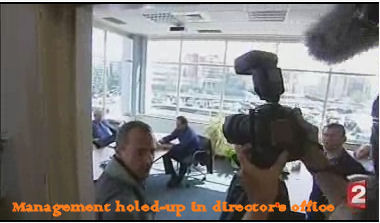
Suddenly the door of the director’s office gives way. The managers are there. They look haggard.

The workers surge in, boo-ing and whistling at them.
“We’re on strike. It’s not unemployment, thug!” a worker calls out twice towards the Director.

The Director General of Caterpillar France, with the almost unbelievable name of Nicolas Polutnik, mumbles incoherently something like, “ In the time to come … free… one could …. wait and see…in order to give a chance ...” It sounds a little as if he is avoiding making any legal commitment by talking nonsense. The press commentator remarks that the director could not come up with anything more.
Someone off-screen calls out, “You’re a thug! You’re a thug!
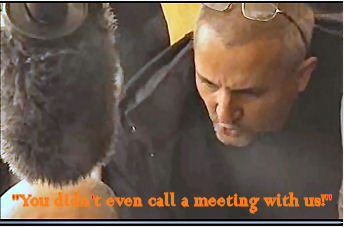
A worker berates the director from behind: “M le Directeur, you weren’t even capable of calling a meeting to discuss the situation …:”
Caterpillar, the US construction group, announced only two months ago a vast plan to get rid of jobs – 22,000 in the world, 733 out of 2,006 in Grenoble.
This was the only solution that the workers could find - “Taking hostages” - as they call it, in the hope of having their voices heard.
Benoit Nicolas, spokesman from the Workers Federation (Confederation Generale du Travail (CGT) spokesman, speaks through a loud-hailer:
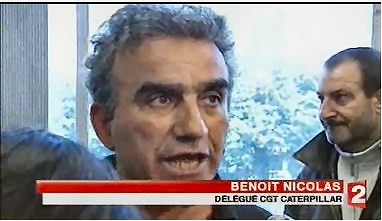
“What we want above all is an equitable sharing of the wealth which has been obtained through the living force of this enterprise, that is to say, the workers!”
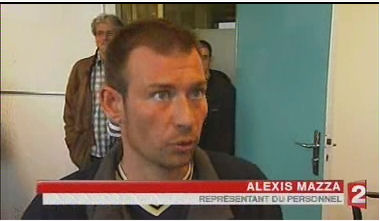
Bosses for another night on the office-carpet until they agree to negotiate
Alexis Mazza, representing the employees, said, “Today they [management] refuse to negotiate, therefore they will remain here, they will sleep here, in order to think things over, because you can’t flog workers like that! ”
No negotiation was able to be started on this day (Tuesday 31).
Source: France2 News, Tuesday 31 March 2009, 2000hs edition
No doubt many corporations like Caterpillar, backed up by the same governments which have thrown taxpayers’ money at banks and big business, will be finding ways to communicate with the Caterpillar management at Grenoble. They will be telling them to hold out at all costs, because, if they give in and negotiate, workers throughout the world will see how easy it is to have the upper-hand on the hachet-men of the power-elites.
After all, there is really no reason to keep the management and owners of these factories. The workers could take over now and simply produce for local needs, or trade modestly where there was a need. The same could be said for most large enterprises like this. Vast profits are only necessary where the cost of land and rent are artificially pushed up by land-speculation, more of a problem in the English speaking countries which have different land-tenure laws from Western continental Europe. (And that problem, of course, urgently needs confronting.)
Polluters, Pollies or Pettifoggery?
Well done GW: It's a dirty job but someone has to do it

Illustration adapted from original at http://www.lowbird.com/data/images/2008/02/george-w-bush.jpg
Uncharitable
I think you have all been most unappreciative of President Bush's achievements. Not just uncharitable but lacking in insight about the way the world works and what has to be done to maintain our way of life. President Bush has done a great job here in very difficult circumstances, and he does not get due credit.
The basics
Let's sketch the basics. We 1.5 billion in rich countries could not have anything like our affluent living standards, our good health standards, our security, indeed our cultural life if we were not getting far more than our fair share of the world's resources. We consume something like 17 times the per capita amount of things like oil that the poorest half of the world's people average. Now that doesn't happen automatically. It has to be organised, and that takes a lot of difficult work. Billions of poor people in the Third World would rather not see their resources and their own labour used to produce wealth to ship out to enrich the corporations and the supermarket shoppers in the rich countries.
Realpolitix
So the first task is to make sure they don't see the situation as illegitimate. This is fairly easily done by the economists who explain that the only and the right way for things to be produced and allocated is by allowing the market to make the decisions. Or course markets always let the rich take everything, because they can outbid the poor. If there's ever any grumbling about this the IMF, the World Bank and the WTO are on hand to let them know that if any government was silly enough to depart from sound market principles then they would get no loans, or assistance with their impossible debt, and they would be banned from exporting anything. They usually get the message and shape up.
Ah, but unfortunately there are always a few knucklehead governments and rebel groups which persist in wanting to devote their nation's resources directly to the improvement of their people's welfare rather than see them flow out to enrich others. These people often call themselves "nationalists" but of course we identify them as subversives, insurgents, communists and/or terrorists. They do things like cut oil pipelines, wage civil war, sell drugs, and try to depose legitimate governments, and cause refugees and famines. Nice people in orderly rich countries despair at these silly people who don't understand proper economics and seem to delight in beating each other up and disrupting sensible development.
Good old-fashioned approach
So from time to time we have to take on the burden of straightening things out, banging a few heads together, supporting the correct faction with money and arms and getting rid of "uncooperative" governments, so that peace can be restored under governments that will rule properly. Sometimes we have to act pretty decisively to restore order, in fact sometimes we have to smash the country to shreds and kill several hundred thousand people in the process, but as US Secretary of State Madeleine Albright said when our sanctions killed an estimated 500,000 people in Iraq, it's worth it.
More basics
Look, people at the supermarket checkout counter don't understand how serious the situation is. If we can't go on getting oil at the rate we have become accustomed to those shelves will be bare. The stuff's getting scarce now. The Chinese are after it; that's why they're supporting murderous regimes in Africa without asking any questions. Now you can't secure the stuff just by being nice and asking to buy some; you have to go after it strenuously and sometimes you have to throw a little weight around, or some other bastard will get it first. That's what geopolitics is about. It's dog eat dog and devil take the hindmost out there. Most wars in history have been about grabs for resources. That's what The Great game in central Asia has been about and is about now. We have to secure our oil fields and we have to get safe routes for those long pipelines to sea ports, through foreign countries, some of which don't like us much. We can't build them and we can't protect them unless we have military bases and unless we bribe or bully some of those regimes into doing what we want.
Securing the Empire
So can't you see that we had to take Iraq and Afghanistan. And what if Saddam had decided to stop trading oil in US dollars! GW and the team bit the bullet; they did what was necessary. And GW has been a great front man; he's taken the flak for a tough and dirty but crucial job. When everyone's criticising and you can't tell them what you are really doing its best if the mess looks like a mistake made by a buffoon.
Yes of course they were clumsy. In the past they have pulled off most of the coups and assassinations and invasions neatly and quietly - got rid of Noriega, Lumumba, the Sandinistas, put in the Shah, supported our kleptocrat Suharto in Indonesia for 30 years, eliminated deviance in Haiti and Grenada (especially important that, can't let the little ones get away with deviatingŠsets a bad example the rest might see they can follow)Šwith not a grumble at home. Mind you they did stuff up a bit on Cuba and Venezuela.
So yes they did miscalculate in Iraq and Afghanistan but securing the empire is a difficult job, and it's a vital job. You cannot live in the way you have become accustomed, let alone have the 3% p. growth you insist on, unless we go on getting control of most of the dwindling resources an that means running those countries to our benefit not theirs. George and the Neo-cons have done it for you, in difficult circumstances. I think their critics should just be a bit more understanding and appreciative. If you want to go on living with your too-big houses and your plasmas and your jet-away vacations just quit the backchat and support your empire and those who secure it for you.
Harold Pinter has died
Excerpts plus comments posted by Frank Holland
Harold Pinter has died.
His Nobel speech summed up many European's view of the USA, I wonder how Obama will address those truths.
A few snippets
The United States Congress was about to decide whether to give more money to the Contras in their campaign against the state of Nicaragua. I was a member of a delegation speaking on behalf of Nicaragua but the most important member of this delegation was a Father John Metcalf. The leader of the US body was Raymond Seitz (then number two to the ambassador, later ambassador himself). Father Metcalf said: 'Sir, I am in charge of a parish in the north of Nicaragua. My parishioners built a school, a health centre, a cultural centre. We have lived in peace. A few months ago a Contra force attacked the parish. They destroyed everything: the school, the health centre, the cultural centre. They raped nurses and teachers, slaughtered doctors, in the most brutal manner. They behaved like savages. Please demand that the US government withdraw its support from this shocking terrorist activity.' Raymond Seitz had a very good reputation as a rational, responsible and highly sophisticated man. He was greatly respected in diplomatic circles. He listened, paused and then spoke with some gravity. 'Father,' he said, 'let me tell you something. In war, innocent people always suffer.' There was a frozen silence. We stared at him. He did not flinch.
Innocent people, indeed, always suffer.
Finally somebody said: 'But in this case "innocent people" were the victims of a gruesome atrocity subsidised by your government, one among many. If Congress allows the Contras more money further atrocities of this kind will take place. Is this not the case? Is your government not therefore guilty of supporting acts of murder and destruction upon the citizens of a sovereign state?' Seitz was imperturbable. 'I don't agree that the facts as presented support your assertions,' he said.
[...]
The United States finally brought down the Sandinista government. It took some years and considerable resistance but relentless economic persecution and 30,000 dead finally undermined the spirit of the Nicaraguan people. They were exhausted and poverty stricken once again.
The casinos moved back into the country. Free health and free education were over. Big business returned with a vengeance.
'Democracy' had prevailed.
[...]
The United States supported and in many cases engendered every right wing military dictatorship in the world after the end of the Second World War. I refer to Indonesia, Greece, Uruguay, Brazil, Paraguay, Haiti, Turkey, the Philippines, Guatemala, El Salvador, and, of course, Chile. The horror the United States inflicted upon Chile in 1973 can never be purged and can never be forgiven.
Hundreds of thousands of deaths took place throughout these countries.
Did they take place? And are they in all cases attributable to US foreign policy? The answer is yes they did take place and they are attributable to American foreign policy. But you wouldn't know it.
It never happened...
It never happened. Nothing ever happened. Even while it was happening it wasn't happening. It didn't matter. It was of no interest. The crimes of the United States have been systematic, constant, vicious, remorseless, but very few people have actually talked about them. You have to hand it to America. It has exercised a quite clinical manipulation of power worldwide while masquerading as a force for universal good. It's a brilliant, even witty, highly successful act of hypnosis.
I put to you that the United States is without doubt the greatest show on the road. Brutal, indifferent, scornful and ruthless it may be but it is also very clever. As a salesman it is out on its own and its most saleable commodity is self love. It's a winner. Listen to all American presidents on television say the words, 'the American people', as in the sentence, 'I say to the American people it is time to pray and to defend the rights of the American people and I ask the American people to trust their president in the action he is about to take on behalf of the American people.' It's a scintillating stratagem. Language is actually employed to keep thought at bay. The words 'the American people' provide a truly voluptuous cushion of reassurance. You don't need to think. Just lie back on the cushion. The cushion may be suffocating your intelligence and your critical faculties but it's very comfortable. This does not apply of course to the 40 million people living below the poverty line and the 2 million men and women imprisoned in the vast gulag of prisons, which extends across the US.
[...]
The Invasion of Iraq
The invasion of Iraq was a bandit act, an act of blatant state terrorism, demonstrating absolute contempt for the concept of international law. The invasion was an arbitrary military action inspired by a series of lies upon lies and gross manipulation of the media and therefore of the public; an act intended to consolidate American military and economic control of the Middle East masquerading - as a last resort - all other justifications having failed to justify themselves - as liberation. A formidable assertion of military force responsible for the death and mutilation of thousands and thousands of innocent people.
We have brought torture, cluster bombs, depleted uranium, innumerable acts of random murder, misery, degradation and death to the Iraqi people and call it 'bringing freedom and democracy to the Middle East'.
How many people do you have to kill before you qualify to be described as a mass murderer and a war criminal? One hundred thousand? More than enough, I would have thought. Therefore it is just that Bush and Blair be arraigned before the International Criminal Court of Justice. But Bush has been clever. He has not ratified the International Criminal Court of Justice. Therefore if any American soldier or for that matter politician finds himself in the dock Bush has warned that he will send in the marines. But Tony Blair has ratified the Court and is therefore available for prosecution. We can let the Court have his address if they're interested. It is Number 10, Downing Street, London.
-----------------------------------------------
Comment
Pinter does not add the other crimes, white collar crimes, emanating from New York and London, the crimes of milking and debasing the financial systems of the free world.
Now Obama will replace Bush, Brown has replaced Blair, but the past sins remain. I have no doubt Obama will try to solve both the energy crisis and the financial crisis by a massive investment in renewable energy projects, and Brown is strutting his stuff as the saviour of the world banking system. They will both hope that we can forget Iraq etc, but should we?
--
Exerpts plus comments posted by Frank Holland
The battle for Brown Mountain is on

Story by Jill Redwood
The immense trees that have sheltered and raised hundreds of generations of owls and gliding possums are now being hacked down by VicForests. The understorey of tree ferns and waratahs, twining silkpod and musk daisy bush are being crushed into the mud by 40 tonne bulldozers.
Victoria’s Brumby government is allowing their logging department to destroy these ancient treasures - home to threatened species like the Powerful and Sooty Owls, the Long-footed Potoroo and the secretive Spot-tailed Quoll.
This is the forest that was promised for protection in 2006 by the State Labor Government. So why is it being destroyed now? … (click here) read on …

Flawed maps and broken promises
In 2006, the then premier, Steve Bracks, made a promise to “protect all significant stands of old growth currently available for logging”. This, with several other areas called icon forests amounted to about 41,000 ha. However, he also promised there would be no impact on the logging industry - an impossible undertaking.
A few days before the 2006 election, the Environment Minister’s office (then John Thwaites) did a quick and dirty job of throwing the old growth maps together -. It was so badly mapped it included cow paddocks, logged forest and burnt regeneration. In the two years since this promise was given, hundreds of hectares of Old Growth Forest have been logged while conservation groups tried to engage a stubborn government to reassess the maps. Cow paddocks were safely protected, but magnificent old growth was crashing to the ground.

Fiction writers employed while old growth falls.
Post election, the Labor government engaged a couple of logging industry supporters to write a report on how the industry in East Gippsland would manage if these forests were protected. Pete Steedman was an old ALP head-kicking hack and Graham Gooding was the former head of the Victorian Association of Forest Industries. The result was a great piece of fiction and spin that only the logging industry can create. For instance, despite the fact that the declining logging industry provides less than 2% of the region’s employment, their document claimed it was 50% or more. Fearful of a union backlash, the government did nothing - no reassessment of maps, no protection, no tourist walks, no pay-outs; just more clearfelling of old growth forests.
The year 2500 is a long time to wait for these big trees to regrow again.
Old Growth Walk for visitors
The maps also left out the very area that was promised for the visitors’ walk. In the 2006 policy document Victoria’s National Parks and Biodiversity, Mr Bracks stated he would “Invest $1.3 million to create … the Great Short Walks of East Gippsland”. This was to include the “Old Growth Walk - Goongerah” (Goongerah is the nearest small town to Brown Mountain).
In the late 1990s, a member of EEG discovered this magnificent stand of forest and called it the Valley of the Giants. Since then hundreds of visitors have experienced these grand trees, which have names like Almo, Lofty, Uncle George, Steadfast and Big Foot. The track was tagged and has become a well known but unofficial walk that is easy to access on a gentle slope and with the Brown Mountain Creek rainforest running through the centre. We have taken two parties of government officials in there in order to negotiate this area becoming formally recognised as a walk. Now half of it has been hacked down.

VicForests rides roughshod over government policy
VicForests was created in August 2004 to ensure logging public forests was a profitable business. It has never made a profit since then despite millions in govt handouts. The unruly band of old-school loggers within VicForests could see that Brown Mountain might be protected before they could get to it’s real estate, so in early 2007, they planned for last stands of unprotected old growth to wiped out.
EEG duly sent our formal objection to VicForests, as part of the sham called ‘public consultation’. VicForests’ duly told us that it was all perfectly legal and to bugger off. They later told the Minister’s office they didn’t know this coupe was contentious or a planned walk!
In late October 2008, VicForests sent the loggers in to start wiping these carbon, water and wildlife rich forests off the face of the planet. Not to mention our old growth walk. Not only that but they had to gall to name the coupe “The Walk” in full knowledge of what they were doing; another example of the goading, fibbing, cowboy nature of this organisation.
These trees would have been mature when Shakespeare was writing his plays. The tree ferns that shelter beneath them could be twice as old. The forests have survived hundreds of years of storms, snow, drought and the occasional fire. They are now being obliterated from the landscape in 4 weeks by a team of 5 men - as part of an “approved logging operation”. Work for five blokes for four weeks. Gone forever.
The great irony is that in 1995, when John Brumby was in opposition, he made a very stirring speech at a forest rally in Melbourne.
.jpg)
"... that's what we'll do when we're in government
- no more export woodchipping,
an industry in the future based
on plantations and the proper protection
of our high conservation value forests." (John Brumby 1995)
See the link below, for the video footage of his powerful words.
http://www.engagemedia.org/Members/pvmedia/videos/brumby-for-web.mov/view?searchterm=brumby

Who is the government afraid of?
Is this government so easily cowered by a bunch of ruthless welfare recipients that run VicForests? Or is it the weedy might of the loggers union that scares them?
Please - write letters to Gavin Jennings and John Brumby expressing your outrage. Enough old growth forest has been destroyed and converted to pulpwood farms in East Gippsland over the past 40 years. Far too much of the little that remains has been lost since their 2006 promise to protect our old growth.
The logging of this most significant stand of old growth on Brown Mountain is the ultimate statement of contempt for the public’s deep concern and love for our ancient native forests.
Hon John Brumby
Premier of Victoria
1 Treasury Place
Melbourne, Vic 3002
john.brumby[AT]parliament.vic.gov.au
Hon Gavin Jennings
Minister for Environment,
Level 22
50 Lonsdale St
Melbourne, Vic 3002
Gavin.Jennings[AT]parliament.vic.gov.au
Same money, same message: Barrack Obama (US) and Jack Layton (Canada)

(Original source: http://problemsoftheworld.com/archives/tag/painted-girls/; uploaded by bgn59)
Wall Street money talks while the Lips of Barrack Obama and Jack Layton move in sync.
It all makes sense now. Why a socialist. Oh, I’m sorry. Why a “social democrat” from the frozen north, Canada, would come down to the Denver convention of US Democratic Presidential nominee Barack Obama to roll over on his stomach and bark at his feet. They both stand for the same things. But not quite in the way Canada’s Jack Layton, leader of the leftist NDP, says they do.
He said, “Democrats here are talking about the same kind of change we’re talking about in Canada.” Layton’s correct there. Democrats are talking about turning a blind eye to runaway population generated by both illegal and legal immigration. He continued, “Whether it’s real action on climate change, forging trade policies that work for working families or standing up for jobs and better health care, there is a real desire here to put the concern of the kitchen table head of the board room table.”
That must be news to Wall Street, Jack. They bought and paid for Obama, and now this socialist from the north has come down to Colorado and told everybody that their nominee is concerned about ordinary people. But, hey wait. Democrats have been doing that for decades. They talk like Robespierre and govern like Louis XIV.
In assessing a politician it is best to cast rhetoric aside and look at who is bank-rolling his campaign. Follow the money trail. The true alignment of the Democratic Party with corporate interests can be vividly illustrated by referring to The Centre for Responsive Politics (CRP). http://www.opensecrets.org Bluntly put, the big banks, financial firms, corporate law firms and private equity companies on Wall Street pay the pipers of both parties. But Jack Layton’s comrade Democrats are their clear favourites as the figures will show. Let’s cite some examples of the more prominent corporate contributors.
The Financial/Insurance/Real Estate Industry gave 51% of their $51 million in 2008 to Jack’s friends, the Democrats.
The Information Technology sector gave 67% of its $27 million in contributions to the Democrats in 2008.
This year the Democrats have received almost $24 million from Agribusiness, representing 41% of their influence-peddling.
This is interesting. Wall Street law firms have sent 75% of their over $140 million in political contributions to the two-faced Democrats.
Listen to this. The Defense Industry gave 52% of its 8 million in donations to Jack Layton’s allies, the Democrats, in 2008. As Canadians know, Layton is a fierce opponent of the war in Iraq. I suppose if the Defense Industry had given its money to the Republicans it would have been referred to as “the Military Industrial Complex” once more. The electronics sector of the Defense Industry gave 55% to the Democrats.
Wall Street promotes the candidates who serve its interests and the Democrats have delivered for them since their November 2006 victory. Democratic leaders buried a proposal to tax the massive incomes of hedge fund operators at normal rates, allowing billionaires to claim most of their income as capital gains taxed at a far lower rate. Obama also refused action on the subprime meltdown that would have threatened big financial interests.
Barack Obama took in $102.1 million for all of 2007 and by February 22, 2008 had raised $138 million, including a million from private equity firms and $9 million from corporate law firms. And hold on to your seat belt. By the August 28/08 Barrack Obama had raised $389,423,102. Friends, that money most assuredly did not come from cab drivers, hairdressers, carpenters, supermarket clerks, gardeners or the working families sitting at the kitchen table that Jack Layton’s rhetoric conjures up. It came from ordinary, down-to-earth corporate goliaths like AT+T who gave $168,613 to Obama. And City Group who gave him $389,989. And Microsoft who gave him $274,375.
Now why would Microsoft give a candidate like Obama a political donation? Their donation is explicable by an Obama policy statement that maintains support for “improvements in our visa programs, including the H-1B programs, to attract some of the world’s most talented people to America.” But the most talented people in the world are already in abundant supply in America. The only problem is, Obama’s corporate IT benefactors don’t want to pay them the salaries they command. Better to flood the market with Asian visa workers who can be paid at 60% of that rate. Buying a pliable President and congress for even $1 billion in campaign contributions would be bargain for the IT industry.
Upon reviewing their take, one must say that for a progressive party of the downtrodden, the Democratic Party of the United States of America has done pretty well for itself, as did Mr. Obama, holding out a tin cup on Wall Street and doing their panhandler act.
I just loved their spiel too. “Please Mister, could you spare me a million, when I am elected I’ll open up the floodgates to more cheap labour, destroy another five million middle class jobs, expand the visa programs, displace jobs, depress wages, replace Canada as the country with highest population growth rate in the G8 and accelerate green house gas emissions, ruin the environment. Please Mister. Please. I won’t let you down sir..’
Now, it’s true. Organized labour has deployed 91% of its donations toward the Democrats and this has offset the corporate influence. But the scale is so pitifully small as to be compared to a peashooter firing back at a cannon. But then, if Big Labour did have the same financial clout, how would they wield it? The answer is not encouraging.
Until 1993 it was understood by trade union leaders that a tight labour market was a workers best friend. As the Democratic Socialist leader of Vermont, Bernie Sanders put it, “If poverty is increasing and if wages are going down, I don’t know why we need millions of people to be coming into this country as guest workers who will work for lower wages than American workers and drive wages down even lower than they are now.’
Obviously Bernie Sanders is not Jack Layton’s kind of socialist. Nor was J. S.
Woodsworth, the founder of the CCF, the precursor to Mr. Layton’s New Democratic Party, since Woodsworth favoured restrictive immigration policies during his tenure as leader before the war. Layton is intent upon “jacking” up Canada’s immigration intake another 70-80,000 people immediately to achieve his arbitary goal of an annual quota equivalent to one percent of whatever of the country’s population level is. He maintains a steadfast ignorance of any study that undermines his rationale for growth. Studies like the C.D. Howe report that revealed that pensions could not be indefinitely supported by increasing immigration unless immigration was multiplied 28 times its existing level. Is Mr. Layton prepared to process over 7 million immigrants a year just to support pensioners? It would be interesting how his “Green Agenda” held up after a population hike like that after five years. Not to mention his plans to cut GHG emissions. And then there is that inconvenient Statistics Canada report of May 2007. The one that showed that immigration has depressed Canadian wages. That’s good news for the people who sit at the board room table. Bad news for the people who sit at the kitchen table that Jack claims to speak for.
In America, the voice of organized labour, the AFL-CIO, is singing in harmony with Obama’s Democrats. But the song is not “Solidarity forever”, its “Money, Money, Money”. In 1993 the AFL-CIO made a shocking break with its past by attacking the critics of illegal immigration. Three years later it joined a coalition of business, agribusiness and Christian conservatives to kill provisions of bill to limit refugee admissions and verify social security numbers of newly-hired workers to discourage illegal workers. But the landmark moment came in February of 2000 when it was announced that the AFL-CIO would “support expanded immigration, lenient enforcement of immigration law and the legislative agenda of immigrant advocacy groups.” Translation: The AFL-CIO was abandoning American workers to champion legal and illegal immigrant workers in their greed to recruit and harvest a larger dues-paying base.
Organized labour in Canada, as represented by the CLC, and its parliamentary wing, Jack Layton’s NDP, has precisely the same attitude. Xenophiliacs who love strangers within our gates more than the workers born right here. Some would call this a Christian attitude. Perhaps they should refer to 1st Timothy 5:8. There are many translations. But essentially, charity begins at home, and if you don’t begin at home, you aren’t practicing Christianity. I would prefer to call it an attitude of selfish condescension, one easy to accommodate if you are a trade union bureaucrat with a degree in Labour studies or economics sitting in an office insulated from layoffs and passing judgment upon “ignorant” blue collar workers who are obviously guilty of “false conciousness” because they don’t see the world as you do. Tougher though if you are on the front lines of competition, mopping a hospital floor for a subsistence wage and you’re in danger of losing your job because it might be contracted out to a cut-throat company that uses illegal immigrant workers. The ones the CLC says enrich our culture.
The reality is that although Jack Layton and Barack Obama may be talking about the same things, the populist script they are reading from is carefully crafted to decoy our notice from their corporate obligations. We may hear their rousing speeches, but it is money that is doing the talking, and it has an agenda. Its agenda is not American or Canadian. It is globalist. And it will do anything to have its way. It plays dirty. It doesn’t care about equality, but if it needs to, it will play the race card. It doesn’t care about migrant workers, but if it needs to, it will pretend to care. It doesn’t care about cultural diversity, but if needs to build up a constituency among Hispanics to gain support for amnesty and a bigger labour pool, it will. And it doesn’t care about the environment, but when there was a danger that the Sierra Club was going to return to its former policy of favouring restrictive immigration policies to stabilize the country’s runaway growth, a billionaire stepped in with $100 million to ensure that it didn’t happen.
Wall Street money talks. And if it keeps talking, in four decades, thanks to corporate mandated manic immigration, one half billion North Americans may be alive, or dying, to hear, the sound of a silent spring and a dead continent.
Thanks, Jack, for your role in making it happen.
Tim Murray
Quadra Island, BC
August 29/08
High-immigration lobbyist blames high immigration for housing crisis on April Fools Day.
Time, money and patience wasted by incompatible computers, printers and software
I am so sick of buying printers. Each new series has more bugs and expenses than the last. Every time Windows comes out with new software or I upgrade my computer I run into problems. At the moment my HP Photosmart 3100 series refuses to print all black, despite a brand new cartridge (ridiculously expensive and small) until I replace the magenta cartridge. My friend, who uses Linux, has an ancient little printer which prints without special programs, without fuss, without self cleaning... it just does the job. It can be filled with generic inks and the cartriges manually refilled. It does not waste my time. HP Photosmart 3100 series WASTES my time. I hate it. I resent the several hundred AUD I spent on it. And I have another printer - a Canon laser. It simply refused to collaborate with my new computer. So now that my HP Photosmart 3100 series is holding me to ransome (and another member of the family has a car so I can't go down and blow some more money on a magenta cartridge in order to print in black and white) I tried printing with my other computer (you need a few; they are so damn jinxed by windows XP [I certainly won't be buying Vista]) using the Canon, but, wouldn't you know, there is a big blaze of white down the centre, so I will have to fill out the missing words in biro so I can take the article to read at my radio show. I think I may mention the problems with printers there. We customers are simply being hung out to dry by big business which is commercially all in league to herd us to less and less useful, more and more complex, resource intensive 'solutions'. I guess it keeps us out of politics a little more than we otherwise might be.
What is this thing called "Progress"?
Are nuclear fusion, fission and 'renewables' viable alternatives to fossil fuels?
Andrew Bartlett's articles, as well as attracting posts from people, like myself, who are critical of his pro-population-growth stance, also attracts critical posts from extreme market fundamentalist anti-environmentalists, who object even to Bartlett's flawed and limited pro-environmental stance as well as his progressive humanitarian values. One of those contributors, 'alzo', posted the comment:
"Fission reactors should tide us over until fusion reactors become a reality. There are lots of possible energy sources."
This is my response.
Alzo, today we seem no closer to realising the dream of unlimited supplies of energy from nuclear fusion than we were thirty years ago. According to one scientist, who has worked on nuclear fusion, the nail in the coffin of nuclear fusion will prove to be the lack of sufficient supplies of the necessary hydrogen isotope tritium. For further information, see the forthcoming second edition of "The Final Energy Crisis" edited by Sheila Newman (http://candobetter.org/sheila).
Hazards of nuclear fission
In regard to nuclear fission, it is obviously a more viable source of energy that just may, if we are extremely careful, provide a bridge towards a more sustainable future whilst stocks of Uranium and Thorium last, however it has a very considerable environmental cost. If we increase the scale of nuclear power generation to the extent necessary to fill the gap power the environmental risks we currently face will be multiplied many times. The Chernobyl disaster. which could have been far worst if not for the quick thinking of those courageous workers on the spot is one illustration. On top of the hazards of nuclear fission electricity generation, even more environmental threats are posed by mining of uranium, enrichment, reprocessing and disposal of nuclear wastes. A likely consequence of the expansion of uranium mining in Central Australia is that the Eastern seaboard stands to be exposed to clouds bearing poisonous radioactive uranium and other toxic metals blown from the mine tailings dumps (see David Bradbury's film "Blowin' in the wind" for a graphic illustration of this threat). In the past, the long-term containment of tailings from mining operation has been problematic and, more often than not, fails in the longer term (as Jared Diamond has illustrated in describing past mining operations in Montana in Chapter 2 of "Collapse" pp35-41). I don't hold out any greater hope that the mining companies will do any better a job containing the mountains of tailings from the planned expanded Uranium mines.
Practical limitations of nuclear fission
Another problem with nuclear fission is that it can only be used to generate electricity. In order to operate transport or run factory machinery or mine milling equipment, the electricity has to be either somehow stored chemically, or transported directly as electricity using power lines, transformers and other expensive infrastructure. In the former case, energy is lost, in creating, for example, hydrogen from water, and the containment of hydrogen necessitates the fabrication of particularly strong and well-sealed containers. In the latter case, large quantities of non-renewable resources, particularly copper, are required, and it is expected that the world's production of copper will begin to decline next year (http://www.sciam.com/article.cfm?chanID=sa003&articleID=000CEA15-3272-13C8-9BFE83414B7FFE87).
Practical limitations of other 'renewables'
The other "lots of possible energy sources" are essentially derived from solar energy or geothermal energy. All require the use of equipment, the manufacture of which now requires non-renewable rare metals, petroleum-derived plastics and fossil fuel energy. The problems in building renewable energy generators, on a scale necessary to indefinitely meet global society's demands, as well as to provide the necessary additional energy to build replacement generators and infrastructure, without reliance upon fossil-fuel energy, appear to be overwhelming. It seems unlikely that this can be done on a scale anywhere near the scale we have been able to do thus far relying on our finite endowment of fossil fuels.
Applying the precautionary principle
So, I would suggest that it would be extremely imprudent to continue to consume natural resources at our current rate, let alone to increase our rate of consumption, and to go on trashing the world's ecology as we are doing now on the assumption that we can find an easy replacement to so much of that conveniently packaged solar energy captured over tens of millions of years that we have found buried under the ground. It would be far more prudent to assume that our current practices are unsustainable, and to begin now to reduce those levels of consumption.
Those who are consuming the most whilst contributing the least to society, such as property speculators and financial advisers should be amongst the first to be made to do so.
Mayors of South East Queensland seek help from developers to push growth plan
Sustainable Population Australia South East Queensland Branch Media Release Monday, 25 June 2007
A recent publication of the Council of Mayors South East Queensland highlights that the mayors of SEQ are seeking help from developers to push the Local Growth Management Strategies (LGMS). These are legal planning documents that force each local government area in South East Queensland to accept unsustainable growth.
The COMmunique1 22 June 2007 states:
“The Council of Mayors (SEQ) will seek the support of the Property Council and Urban Development Institute of Australia to lobby the State Government for a communications campaign to promote key messages regarding the intent and purpose of local growth management strategies under the South East Queensland (SEQ) Regional Plan. Although acknowledging the issue, the State Government has yet to commit to a broad based and high profile campaign.”
“Local government mayors recognize they cannot sell unsustainable growth to their constituents, so they are seeking help from those who desire it most,” said Baltais.
“What is most appalling is that they want this unholy alliance to pressure the Queensland Government to spin a story for them,” said Baltais.
“We urge the Queensland Government to resist this pressure and engage the community in planning for its future with a total review of all targets in the SEQ Regional Plan in light of recent studies and current knowledge.”
Footnotes
1. See document at www.councilofmayorsseq.qld.gov.au/.../20070622_communique.pdf (43K)


Recent comments